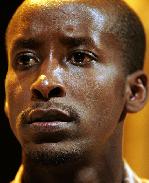SITE GUIDE
SEARCH
REVIEWS
REVIEW ARCHIVES
ADVERTISING AT CURTAINUP
FEATURES
NEWS
Etcetera and
Short Term Listings
LISTINGS
Broadway
Off-Broadway
NYC Restaurants
BOOKS and CDs
OTHER PLACES
Berkshires
London
California
New Jersey
DC
Philadelphia
Elsewhere
QUOTES
TKTS
PLAYWRIGHTS' ALBUMS
LETTERS TO EDITOR
FILM
LINKS
MISCELLANEOUS
Free Updates
Masthead
Writing for Us
A CurtainUp  London Review
London Review
 London Review
London ReviewThe Investigation
|
We call them heroes but their deaths were senseless—Witness
|

Kenny Nkundwa
(Photo: Tristram Kenton) |
The play itself is a transcription of testimonies given during the 1963 trial in Frankfurt where survivors of Auschwitz faced those in charge of the camp. Recounting their memories, the horrific is patchworked together with grim everyday reality. They variously describe how prisoners in the camp would fight over the tiniest shred of food or how merciless, senseless torture and killing was endemic to their existence. Without the aid of anything other than the spoken word, the dialectic of the trial reconstructs both sides' versions with some memories buried and forgotten, some exaggeration and much evasion.
The lack of artifice in this documentary or verbatim play is combined with a cast who have personally experienced such atrocities. In fact, the cast must be the qualified actors imaginable and their sheer emotional bravery in tackling this project is astounding. The production itself enhances this sense of bare authenticity with an uncomplicated, minimal theatrical façade. The stage is blank except for two skeletal lecterns and a raised platform. The delivery of the speeches has a simple directness, mimicking the impartiality of the legal justice system and conspicuously at odds with the emotiveness of the subject.
The actors interchangeably adopt the roles of accuser, accused and interrogator. Interludes of African songs end, lurching back into one cast member accusing another. This brings out a major theme of the production: that the genocide was not two discrete, unbreachably different groups of people but a single humanity inflicting atrocities upon themselves. The production suggests that this is one key to first understanding and then preventing a similar recurrence. As one of the witnesses states, "It was the same men who were both prisoners and guards. . . what happened ought to be comprehensible even today. Those chosen to play the role of prisoners were brought up with the same values as those who played the role of guards. . . And if they hadn't been called prisoners, they might just have easily been called guards. We must get rid of this exalted attitude that this camp world is beyond our comprehension."
There is no heavy handed catharsis or moralistic indictments but just a deceptively simple production which tackles the terrifying cost of ignoring history: how the unimaginable can recur and how humanity overlooks the didactic potential of the past at its own peril.
|
THE INVESTIGATION
Written by Peter Weiss Adapted by Jean Beaudrillard A production by Urwintore Conceived and directed by Dorcy Rugamba and Isabelle Gyselinx With: Léon Athanase Mandali, Lyliane Matabishi, Samuel Muteba, Kenny Nkundwa, Thomas Nyarwaya, Olivier Rangira, Aimable Twahirwa Design: Fabienne Damiean Lighting Design: Manu Deck General Manager: Steve Rukongi Technical Director: Yoris van den Houte In French with English sur-titles translated by Alexander Gross Running time: 1 hour 20 minutes with no interval Box Office: 020 7922 2922 Booking to 11th November 2007 Reviewed by Charlotte Loveridge based on 1st November performance at the Young Vic, 66 The Cut, London, SE1 8LZ (Tube: Waterloo) |
|
London Theatre Tickets Lion King Tickets Billy Elliot Tickets Mary Poppins Tickets Mamma Mia Tickets We Will Rock You Tickets Theatre Tickets |




